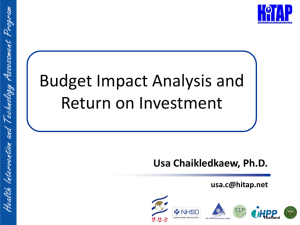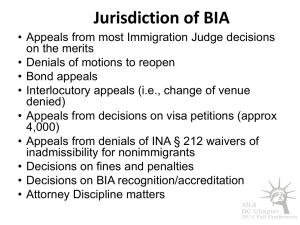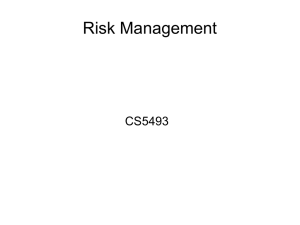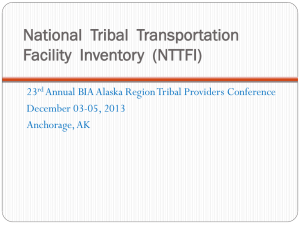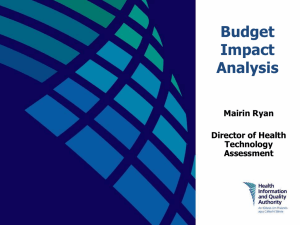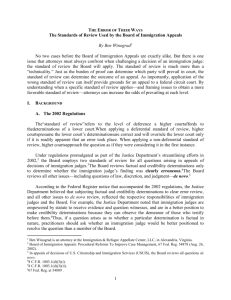Presentation 2
advertisement
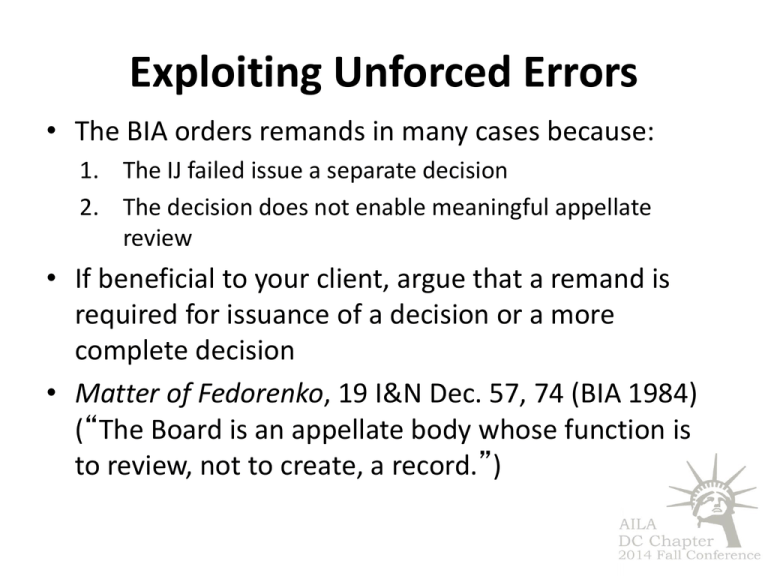
Exploiting Unforced Errors • The BIA orders remands in many cases because: 1. The IJ failed issue a separate decision 2. The decision does not enable meaningful appellate review • If beneficial to your client, argue that a remand is required for issuance of a decision or a more complete decision • Matter of Fedorenko, 19 I&N Dec. 57, 74 (BIA 1984) (“The Board is an appellate body whose function is to review, not to create, a record.”) Exploiting Unforced Errors (cont.) • IJs are required to issue a separate decision, either oral or written. 8 C.F.R. 1240.12(a). • “[S]cattered findings of fact and conclusions of law” in transcript are not sufficient. Matter of A-P-, 22 I&N Dec. 468, 476 (BIA 1999). • “Summary” decisions only permitted if respondent concedes removability and cannot/does not apply for relief. 8 C.F.R. 1240.12(b). • But see Matter of Rodriguez-Carrillo, 22 I&N Dec. 1031 (BIA 1999) (remand not always required) Exploiting Unforced Errors (cont.) • Why would a decision not be sufficient for appellate review? • Decisions must contain “clear and complete findings of fact that are supported by the record and are in compliance with controlling law.” Matter of S-H-, 23 I&N Dec. 462, 465 (BIA 2002) • Decisions must “reflect the Immigration Judge’s analysis of the applicable statutes, regulations, and legal precedents, and clearly set forth the Immigration Judge’s legal conclusions.” Matter of A-P-, 22 I&N Dec. 468, 476 (BIA 1999) Exploiting Unforced Errors (cont.) • IJs cannot deny a motion to reopen “for the reasons stated in the DHS’ brief.” • “When a motion [to reopen] is denied and the reasons for such denial are either unidentified or not fully explained, an alien is deprived of a fair opportunity to contest that determination on appeal. Similarly, this Board is unable to meaningfully fulfill its responsibility of reviewing the immigration judge’s denial of the motion in light of the arguments advanced on appeal.” Matter of M-P-, 20 I&N Dec. 786, 787-88 (BIA 1994). BIA Standards of Review • Factual findings, including credibility determinations, are reviewed for clear error. 8 C.F.R. 1003.1(d)(3)(i). – “The reviewing Board member or panel is left with the definite and firm conviction that a mistake has been committed.” Matter of R-S-H-, 23 I&N Dec. 629, 637 (BIA 2003). • Questions of law, discretion, judgment and all other issues are reviewed de novo. 8 C.F.R. 1003.1(d)(3)(ii). – “Chevron” deference does not apply BIA Standards of Review (cont.) • What is a “factual determination”? • What happened in the past or is currently happening – Whether a respondent was “waved through” a port of entry by an immigration officer – Why a persecutor targeted an asylum applicant (i.e. the persecutor’s motive) – Whether the respondent knowingly and deliberately fabricated elements of an asylum claim • What may happen in the future – Split between BIA and federal courts BIA Standards of Review (cont.) • What is a “question of law”? • “Pure” question of law: – Whether the aggravated felony bar in INA 212(h) applies to all lawful permanent residents, or only to those who were admitted in LPR status at a port of entry. • “Mixed” question of law and fact (of “judgment”): – Whether a respondent’s qualifying relative(s) would suffer “exceptional and extremely unusual hardship” – Whether mistreatment rises to the level of “persecution” BIA Standards of Review (cont.) • What is a “question of discretion”? – Whether a respondent merits a grant of adjustment of status, cancellation of removal, or voluntary departure. – Whether to grant a motion to change venue. – Whether to grant a motion to continue. • Subject to de novo review, not “abuse of discretion” • However, underlying factual determinations still subject to clear error review. Matter of Pinzon, 26 I&N Dec. 189, 190 (BIA 2013). BIA Standards of Review (cont.) • Likelihood of a future event—question of fact or law? • BIA: question of law – “[I]t is impossible to declare as ‘fact’ things that have not yet occurred.” Matter of A-S-B-, 24 I&N Dec. 493, 498 (BIA 2008). • Circuits: what would happen is a question of fact; whether those facts entitle respondent to relief is a question of law – Kaplun v. Att’y Gen., 602 F.3d 260 (3d Cir. 2010) – Turkson v. Holder, 667 F.3d 523 (4th Cir. 2012) BIA Standards of Review (cont.) • Hypothetical: IJ denies EOIR-42B because: 1. Respondent’s conviction for Maryland second degree assault is a CIMT 2. Respondent’s U.S. citizen wife would not suffer “exceptional and extremely unusual hardship” 3. Respondent does not merit a favorable exercise of discretion • What standard(s) of review apply to each issue? BIA Standards of Review (cont.) • Hypothetical: IJ denies EOIR-42B because: 1. Respondent’s conviction for Maryland second degree assault is a CIMT Question of law (de novo) 2. Respondent’s U.S. citizen wife would not suffer “exceptional and extremely unusual hardship” • • What would happen to wife Question of fact (clear error) Whether what would happen amounts to “exceptional/extremely unusual hardship” Mixed question of law and fact (de novo) 3. Respondent does not merit a favorable exercise of discretion • • Underlying factual determinations Question of fact (clear error) Ultimate discretionary determinations Question of discretion (de novo) BIA Standards of Review (cont.) • What should you do if it is unclear which standard of review to apply? • If the IJ ruled in your favor, frame the findings as factual. If the IJ ruled against you, frame the findings as legal or discretionary. • Ask: are Immigration Judges better positioned to make this determination than Board members? If so, the determination can more persuasively be framed as factual Unpublished BIA Decisions • Persuasive but not binding on the Board or Immigration Judges • Not entitled to Chevron deference. Martinez v. Holder, 740 F.3d 902, 909-10 (4th Cir. 2014). • If the BIA issues an unpublished decision that contradicts a prior unpublished decision, it must explain the basis for the deviation. – “[C]ourts typically look askance at an agency’s unexplained deviation from a prior decision, even when the prior decision is unpublished.” Perez-Vargas v. Gonzales, 479 F.3d 191, 193 n.3 (4th Cir. 2007). Unpublished BIA Decisions (cont.) • Jose Armando Cruz, A087 241 021 (BIA Apr. 9, 2014) (unlawful presence bars do not apply after 3/10-year period, even if respondent illegally reentered the country prior to expiration). AILA Doc. No. 14070851. • B-J-G-, AXXX XXX 333 (BIA May 29, 2014) (verbal and psychological abuse can constitute “extreme cruelty” under VAWA). AILA Doc. No. 14080544. • M-G-O-, AXXX XXX 611 (BIA Feb. 4, 2014) (effeminate gay males from Mexico with female gender identity is PSG). AILA Doc. No. 14032146. • David Antonio Lara-Torres, A094 218 294 (BIA Jan. 28, 2014) (upholds motion to suppress due to prolonged traffic stop where non-Latino drivers were not stopped for similar violations). AILA Doc. No. 14031946. • Ramon Garcia-Fonseca, A075 535 094 (BIA June 5, 2014) (guilty plea resulting in less than “conviction” not an “admission” of the crime). AILA Doc. No. 14082241 • For more unpublished decisions, visit www.irac.net/unpublished
